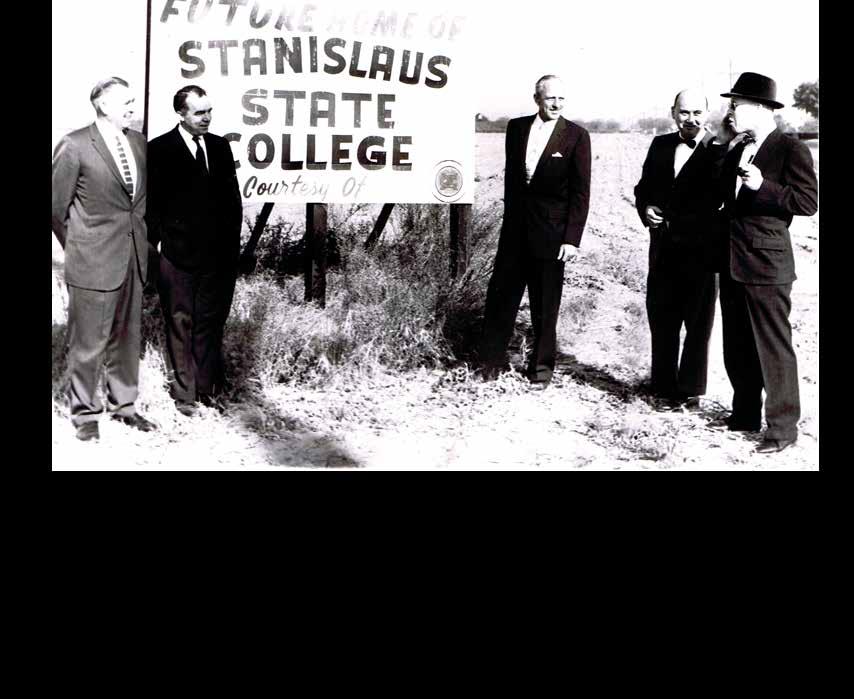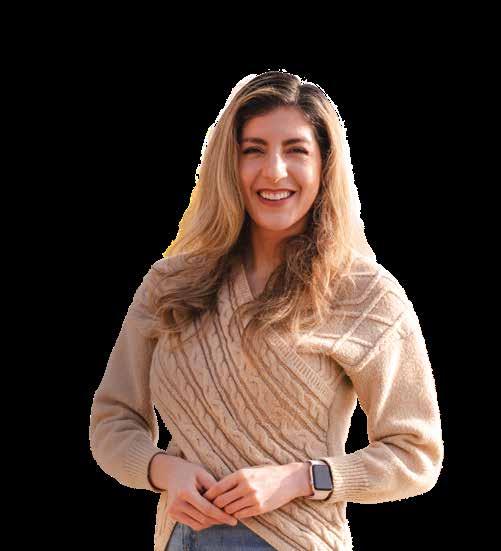




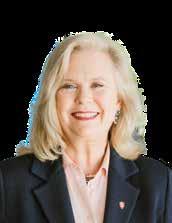

Dear Warrior Community,
As we head into the home stretch of the semester, I’m reminded of why I came to Stanislaus State — and why I believe so deeply in the transformative power of higher education. Every day, I’m inspired by the drive of our students, the dedication of our faculty and staff and the shared commitment of alumni and community partners who believe in what we are building together.
This spring has brought powerful momentum. From expanding our Stockton Campus, where a new academic building is set to open in fall 2025, to advancing careers in healthcare and deepening the innovative partnerships that support them, we continue to grow with intention. Our work is rooted in creating pathways to opportunity and ensuring that higher education remains accessible, affordable and deeply connected to our region.
That momentum continues with our inaugural 1960 Minutes of Giving, a celebration of Stanislaus State’s founding and a chance for everyone to unite in support of scholarships, programs and student success. We invite you to be part of this special effort as we honor our legacy and invest in our future. That spirit of pride and purpose will carry into Commencement, where we’ll celebrate the achievements of our graduates, many of whom are the first in their families to earn a college degree. Plus, we have the very special honor of recognizing Astronaut José Hernández and his father Salvador Hernández with honorary doctorates, the highest honor that can be bestowed by Stanislaus State and the California State University.
These moments reflect the heart of our mission and the pride we feel in serving the Central Valley. They remind us that when we uplift students, we uplift families, neighborhoods and entire communities. And when the Central Valley thrives, we all thrive.
This work is deeply personal to me, and I’m more committed than ever to advancing it. Thank you for your belief in Stanislaus State. Your support fuels our continued rise, and I’m proud to walk this journey with you. Your success is our success.
Britt Rios-Ellis, Ph.D. President
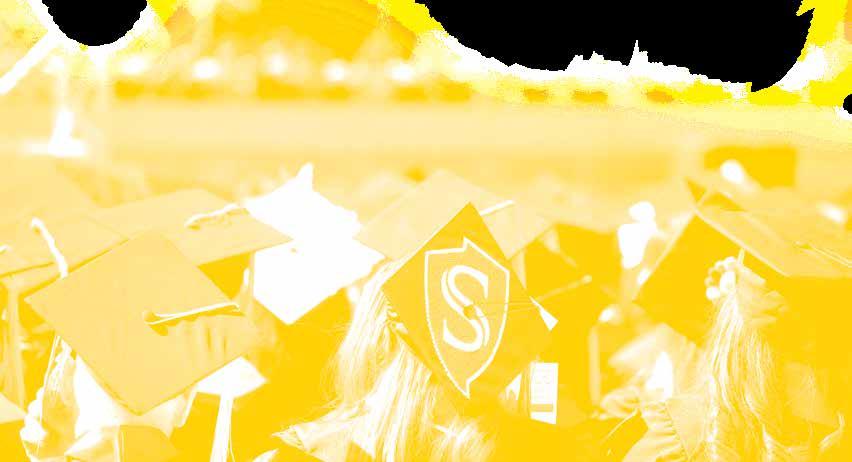
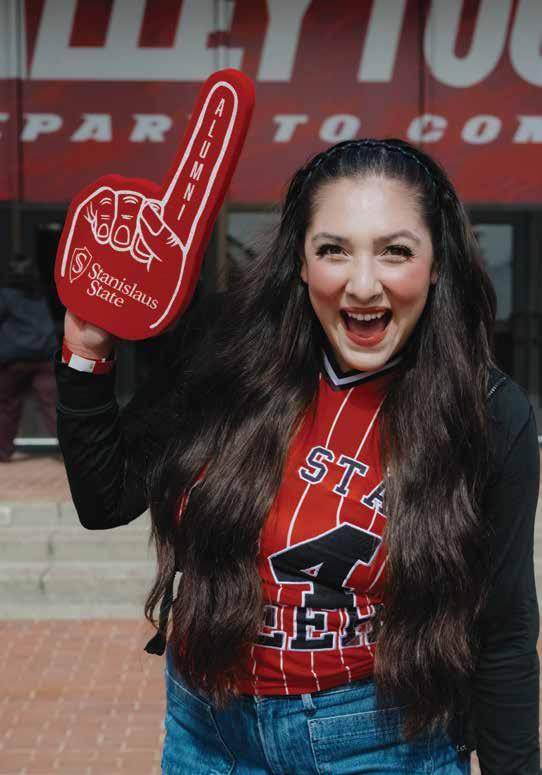

STAN Magazine is published by the Office of Strategic Communications and Marketing at Stanislaus State.
President
Britt Rios-Ellis
Interim Vice President for University Advancement
Senior Associate Vice President for Strategic Communications & Marketing
Rosalee Rush
Director of Alumni Engagement
Tiffany Davis (’13)
Director for Communications and Creative Services
Kristina Stamper (’06)
Senior Writer and Content Specialist
Donna Birch Trahan
Content Specialists
Lori Gilbert (’91)
Kimberly Horg
Digital Communications Specialist
Sara Balisha (’13)
Stay in touch!
Phone: (209) 667-3131
Website Accessibility
Coordinator
Saul Avila (’17)
Graphic Designer
Katie Dowling
Director of Marketing & Digital Strategy
Mandeep Khaira (’02)
Marketing Specialist
Allison Kincaid-Nervino
Photographers
Jas Khaira
Bea Ahbeck Casson
Kayla Lawson
Merri Hansen
Lyet Koffi
Media Production Specialist
Frankie Tovar (’11)
Social Media Specialist
Naomi Carrera (’23)
Web Content Specialist
Edith Cisneros (’21)
marcom@csustan.edu www.csustan.edu/stan-magazine
If you receive more than one copy of STAN Magazine, please pass it along to a friend of Stanislaus State. If you would like to support Stanislaus State, visit www.csustan.edu/giving
Stanislaus State serves a diverse student body at two locations in the Central Valley — a beautiful 228-acre campus in Turlock and the Stockton Campus, located in University Park, a 102-acre site in Stockton’s historic Magnolia District. Widely recognized for dedicated faculty, high-quality academic programs and exceptional value, the University offers more than 100 majors, minors and areas of concentration, along with 19 master’s degree programs, six credential programs and a doctorate in educational leadership. We are a proud member of the 23-campus California State University system.
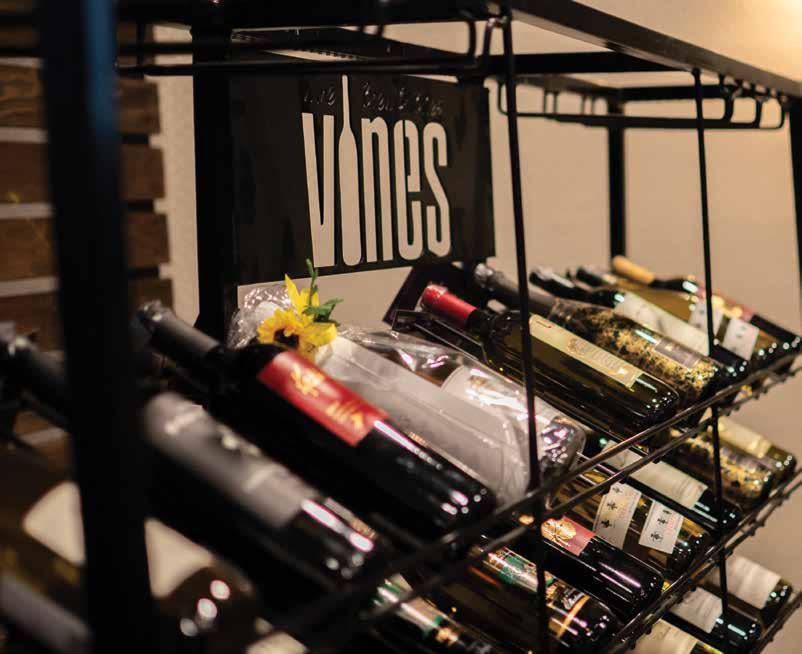
Thank you to everyone who joined us for a memorable evening of community, connection and culinary delights — all in support of Stanislaus State student scholarships and alumni programs.
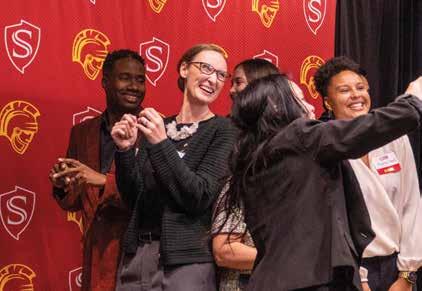


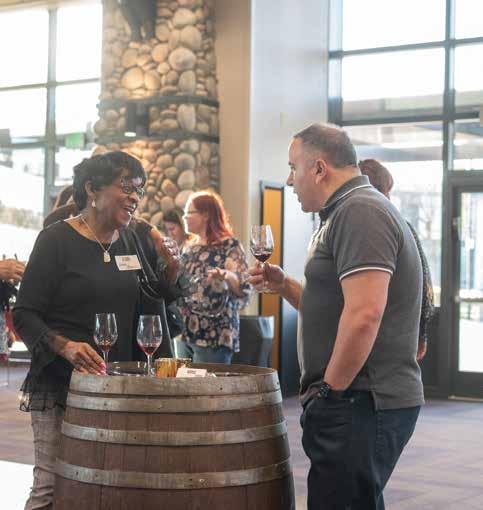
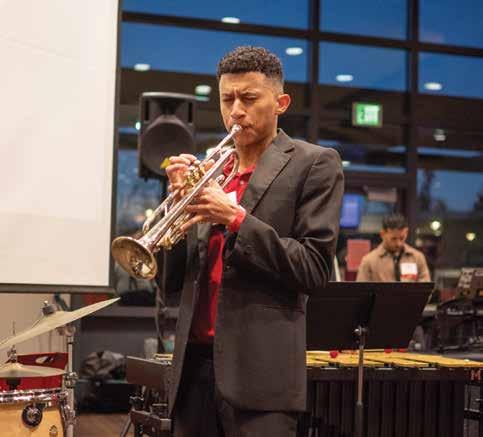
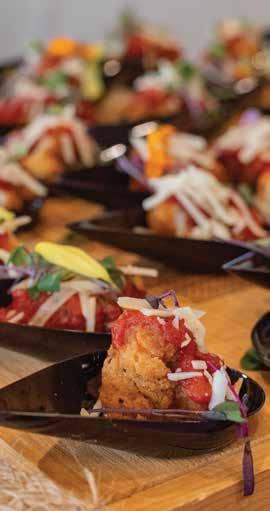
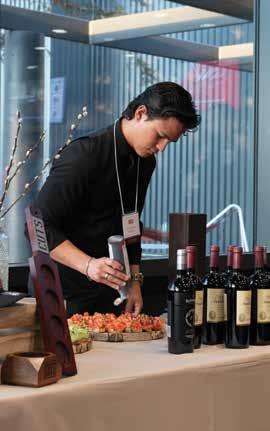

we are here for you and your children, and we are ready to welcome you with open arms.”
For many families, the path to college can feel like navigating an unfamiliar road without a map. At Stan State, ensuring that families feel confident and supported in that journey is a top priority. That’s why the University has partnered with the Parent Institute for Quality Education (PIQE), a nationally recognized organization that has empowered more than 2.25 million students and families to pursue higher education.
Founded in California more than 35 years ago, PIQE serves 25,000 families annually across 49 counties in the state and has expanded to 14 other states. The organization bridges the gap between schools and families, ensuring that parents — especially those from first-generation, immigrant and low-income backgrounds — have the knowledge and tools to help their children maneuver the path to college.
That impact was on display in October 2024, when 65 parents at Patterson High School completed PIQE’s Bridge to College program. President Britt Rios-Ellis, who attended the ceremony, celebrated their achievement and reminded them they are powerful advocates shaping their children’s futures.
“You are leading the way for your children, showing them the value of education and giving them the confidence to dream bigger," Rios-Ellis told the graduates. “At Stan State,
Strengthening this collaboration and the role of the University as an anchor institution in the region, Stan State’s Vice President for Business and Finance and Chief Financial Officer Rose McAuliffe was appointed chair of PIQE’s board of directors in 2024.
“PIQE is an amazing organization,” McAuliffe said. “I first joined the board to provide financial expertise, and I was honored to step into the role of board chair. This work has been incredibly rewarding.
“As a Latina and an English learner, I understand the challenges families face as they do everything possible to help their children succeed academically. My father advocated alongside César Chávez, and his fight for equity and opportunity for all is where my passion for this work comes from.
“Education is one of the most powerful ways for families to overcome hardships. The partnership between Stanislaus State and PIQE will continue to strengthen opportunities for families in the Central Valley, helping them see that a college degree is within reach.”
Dr. Alberto Ochoa, founder of the Parent Institute for Quality Education (PIQE) and Rose Elena McAuliffe, Chair of the Board of Directors for PIQE and Chief Financial Officer and Vice President for Business and Finance at Stanislaus State.
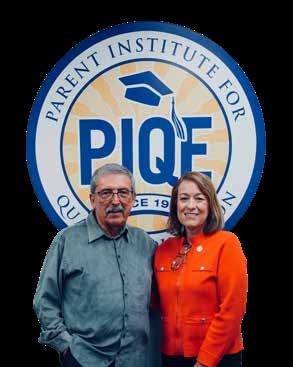
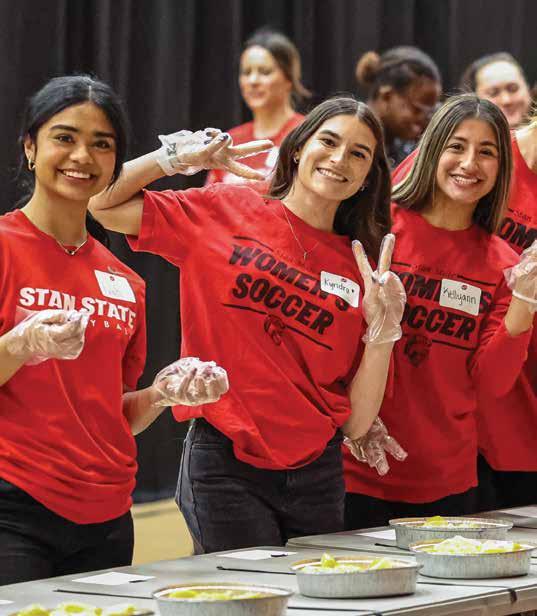
The 2025 Warrior Crab Feed once again brought the community together for a night of fun, food and philanthropy, selling out weeks in advance for the second consecutive year. Held on Feb. 8 at Ed & Bertha Fitzpatrick Arena, the event drew record attendance, reinforcing its status as a signature Stan State tradition.
Featuring all-you-can-eat Dungeness crab, pasta, salad and bread, plus a silent and live auction, music, beer and wine, the evening raised critical funds for the Warrior Athletics Scholarship Fund. Over the past three years, the Crab Feed has generated approximately $300,000, helping studentathletes compete in conference championships and for regional and national titles while pursuing their degrees.
The Warrior Crab Feed has become a premier community event, welcoming alumni, fans and supporters to campus in a show of Warrior Pride. In addition to excelling in competition and in the classroom, Stan State’s studentathletes give back through community service by mentoring youth and supporting local initiatives, further demonstrating the impact of student support.
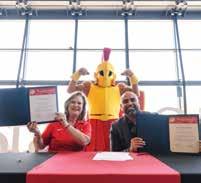
Stanislaus State has deepened its commitment to educational access by partnering with Improve Your Tomorrow (IYT) to guarantee admission for IYT participants who meet the California State University’s admission requirements. The memorandum of understanding (MOU), signed during the University’s third annual Warrior Expo, establishes a pathway to higher education for students. Under the agreement, IYT and Stan State will provide academic and support services to help participants prepare for college. Associate Vice President for Strategic Enrollment Management Maura Gatch says the partnership reflects the University’s mission to foster equity, opportunity and an inclusive learning environment.
learn more
make your impact
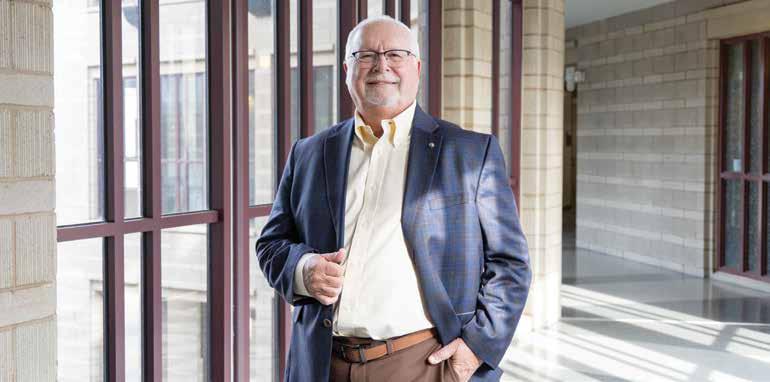
Stanislaus State will honor Clive Grimbleby as its 2025 Champions of the American Dream honoree at a special event on May 6. A respected business leader and dedicated community supporter, Grimbleby has helped shape the region’s financial landscape as the past president and managing partner of Grimbleby Coleman Advisors & Accountants.
After purchasing his father’s bookkeeping and tax business in 1981, Grimbleby grew the company into a thriving firm with nearly 100 employees and 14 principals, specializing in agriculture, construction, estate planning and business advisory services. Under his leadership, the firm has been recognized among Accounting Today’s Best Firms to Work for and Modesto Chamber’s Member of the Year.
A steadfast supporter of Stanislaus State, Grimbleby Coleman generously contributes to the Grimbleby Coleman Scholarship benefiting accounting students. The firm has also played a key role in Meet the Firms Night, Accounting Night and tutoring initiatives, with many Stan State alumni among its team.
The Champions of the American Dream event, part of the Warrior Entrepreneurship & Innovation Program, celebrates individuals who have achieved professional success while making a lasting impact on the Central Valley through mentorship and service.
May 6 Register today
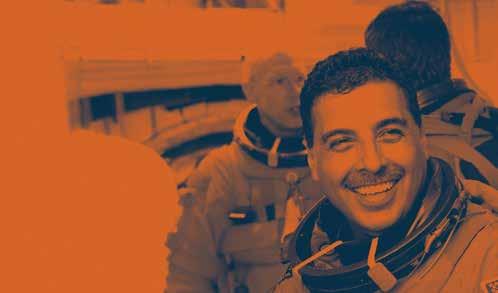
Stanislaus State will mark an outof-this-world milestone at its 65th Commencement in May as Salvador and José Hernández are conferred honorary doctorates.
NASA Astronaut José Hernández will receive an honorary Doctor of Science on May 27 at the College of Science ceremony. The next day, he will stand alongside President Britt Rios-Ellis to present an honorary Doctor of Humane Letters to his father, Salvador Hernández, a farmworker-turnedvineyard owner whose unwavering support helped his son reach for the stars.
Their journey is one of grit, determination and the transformative power of education. Their story, recently captured in the 2022 Amazon Prime film “A Million Miles Away” starring Michael Peña, chronicles José’s experience from working the fields of the Central Valley to orbiting earth aboard the space shuttle Discovery. His father’s receta, or recipe, for success — vision, preparation and perseverance — helped guide the way.
in Stockton. José, who didn’t learn to speak English until he was 12, took his father’s message about education and persistence to heart, earning degrees in engineering. He persevered through 11 rejections before securing his dream job as an astronaut.

After leaving NASA, José founded the Reaching for the Stars Foundation to inspire students in science, technology, engineering and math. He also opened a successful aerospace engineering consulting firm, has authored 3 books and is a motivational speaker. Meanwhile, he and his father built Tierra Luna Cellars, an awardwinning winery gaining international recognition.
“Their path — from the fields to business leadership and to the stars — is a testament to resilience, determination and the power of education,” said Stanislaus State President Britt RiosEllis. “As we celebrate Stan State’s 65th Commencement, we are proud to recognize the Hernándezes’ commitment to supporting others, opening doors and inspiring generations to come.”
Stanislaus State launched a new initiative last fall that brings nationally recognized artists, speakers and thought leaders to campus. The Presidential Celebration Series, which debuted in October, creates space for cultural expression, advocacy and connection. Sponsored by Mocse Credit Union and the Porges Family Foundation, the series aligns with national heritage months and highlights the resilience and contributions of diverse communities.
The first event featured Las Cafeteras, a Los Angeles-based band that blends son jarocho with hip-hop and Afro-Mexican rhythms. The series continued in February with Kenjus Watson, who spoke about activism through storytelling and shared his own personal anecdotes.
Born in Michoacán, Mexico, Salvador Hernández immigrated to the United States as a teenager and worked as a farmworker while raising his family
Stan State’s Commencement ceremonies will take place May 27-30 at the University Amphitheater.

With each event, the series showcases the cultural and aspirational strengths that make Stan State and the Central Valley thrive. More events are on the horizon, offering opportunities for students, faculty, staff and community members to engage with powerful voices.
learn more
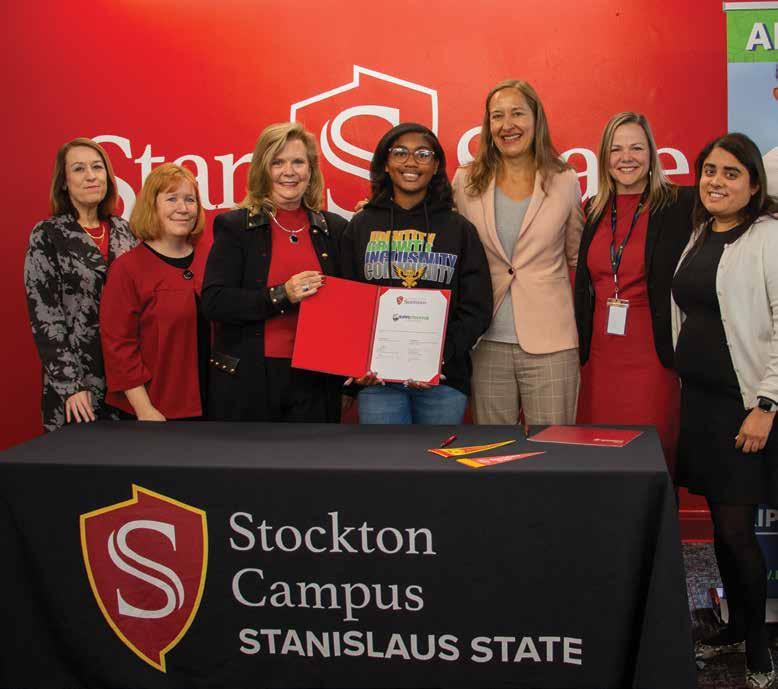
Stanislaus State and KIPP Northern California have signed an agreement to open KIPP Stockton High School on the University’s Stockton Campus in fall 2025. The partnership aims to expand college and career pathways for students in San Joaquin County, offering direct access to a university environment.
The agreement was celebrated at a special ceremony in March, where leaders praised the shared commitment to educational equity.
“Stan State is a hub of learning and career growth in the Central Valley,” said KIPP Northern California CEO Beth Thompson. “We are proud to open our Stockton high school on your campus this August.”
President Britt Rios-Ellis called the partnership an investment in students’ futures.
“KIPP is expanding access to high-quality public schools that change lives,” she said. “We are thrilled to expand that impact here in Stockton. This sends a clear message: Higher education should be within reach for every student.”
Eighth grader Jalicia Mondy, a future member of the school’s founding class, shared her excitement.
“I want to be a role model for my sister and classmates,” she said. “After high school, I want to go to college and become a pediatrician. I feel like I’m
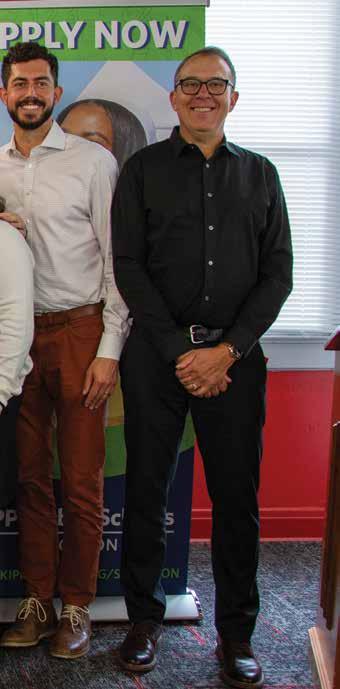
getting a head start by attending high school on a college campus.”
KIPP Stockton High will open with a ninth-grade class and grow to serve grades 9-12. It builds on existing KIPP-Stan State partnerships and reinforces the promise that college is not just a dream — it's within reach.
This fall, STAN Magazine will debut a brand-new digital experience — designed with our readers in mind. While we’ve loved bringing stories to life on the page, we’re excited to evolve into a more interactive, immersive format that meets you wherever you are.
The new digital version of STAN will feature dynamic storytelling with videos, photos and audio, giving you a richer connection to the people and moments that define Stanislaus State. Whether it’s a student’s inspiring journey or a faculty member’s groundbreaking scholarship, you’ll experience it all more vividly than ever.
Going digital also reflects our commitment to sustainability. By reducing print materials, we’re taking a meaningful step toward a greener future — something we know our Warrior community values deeply.
Though the format is changing, our mission stays the same: to celebrate the heart and spirit of Stan State through powerful stories that inform, inspire and connect.
We can’t wait to share this next chapter with you. Stay tuned for our first digital issue in fall 2025!
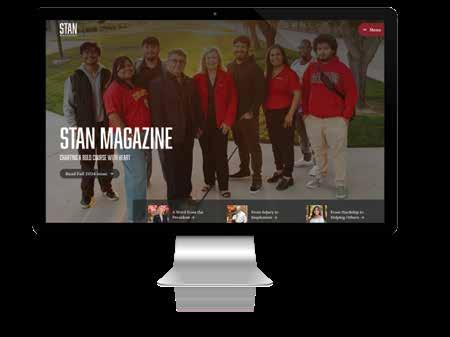

learn more
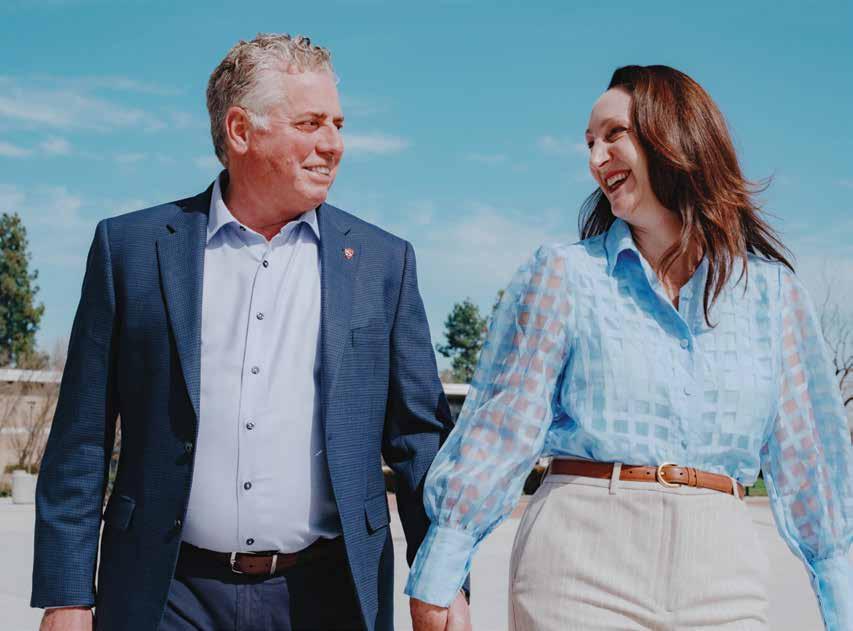
President of Gemperle
The torch in this case is an egg — or at least that is what one might imagine when Steve Gemperle joined the Stanislaus State Foundation Board in 2006, following the legacy of his father Ernie Gemperle, who served as a board member from 1989 to 2006 and held the role of president from 1992 to 1993. Ernie, a longtime supporter of Stanislaus State, was named a Foundation Board Emeritus in 2008 and honored posthumously in December 2023 with the annual Honoring the Past, Forging the Future award.
Steve’s introduction to the University came early. Growing up, his father
BY KIMBERLY HORG
introduced him to numerous Foundation Board members and past presidents of the University, making his eventual involvement with the Foundation Board a natural progression.
“I have always felt that the relationship between the community and the University is very important,” Steve said. “I feel strongly about strengthening that relationship between the University and region and increasing collaboration.”
As a local business leader and president of Gemperle Family Farms — a poultry and egg packing operation in Turlock founded by
his father and one of the leading producers of organic and cage free eggs throughout the Western United States — he sees firsthand how a strong University contributes to the region’s economy.
“A thriving University is one that is successfully educating the youth of our area in order to promote a work force that attracts employers who will provide quality jobs and contribute to the success of our community,” Steve added.
Through his work with the University’s Foundation, he would like to see the Board grow with qualified individuals who are also invested in the success of the University and the economic vitality of the region.
“Many of our employees are graduates of Stan State,” Steve said. “This contributes to a quality work force while also helping support students and the University.”
“Many of our company employees are graduates of Stan State. This contributes to a quality work force while also helping support students and the University.”
- Steve Gemperle
Steve spends his time working at the family business and giving back to the community as well as Stan State. He serves on the Stan State Foundation’s Executive Committee and the Audit Committee and is also
active in the broader community, as a member and past president of Turlock Rotary and past chair of the Turlock Chamber of Commerce Board of Directors.
“My parents instilled in my family the sense of community and sharing our success,” Steve shared. “We grew up with many examples of charity in our daily lives.”
The sixth of seven siblings, Steve and the entire Gemperle family remain close, and all are committed to the values of service and generosity instilled in them by their parents, Ernie and Annemarie Gemperle.
Steve and his wife, Alison (Ali) Morr Gemperle, are dedicated to living these values. Actively involved in a variety of local organizations and causes, they dedicate their time to volunteering and strengthening connections within the region, all with a focus on family.
“Steve is an honest and genuine person and that comes out immediately when you meet him,” Ali said.
It may not come as a big surprise, but the Gemperles eat a lot of eggs. Whether the eggs are used for baking, scrambled, hard boiled or over easy, eggs are always in the kitchen.
“Steve’s eggs benedicts are amazing,” she added.
Ali brings her own leadership to the region, serving on United Samaritans Foundation Board of Directors, Jessica’s House Heart Circle, Off Center Thrift & Gift’s CARE Committee and she recently completed her final board term for Turlock Community Theatre. Additionally, Ali volunteers her professional university advancement
skills with Stan State’s Office of Development as needed.
Together, the couple shares a passion for community building, education and philanthropy. They contribute regularly to organizations including United Samaritans Foundation, All Saints Catholic Church and Jessica’s House.
A Turlock resident, Steve grew up locally and attended Turlock High School. After graduating, he attended UC Davis where he earned a B.S. in Agricultural and Managerial Economics in 1988.
“The intention was always to come back to help with our family farm and give back to the community,” Steve said.
He added the main reason he remains in Turlock is to be close to family. In addition to their engagement within community organizations, Gemperle Family Farms also donates eggs to local charities and supports scholarships for students at Stanislaus State, a tradition that began with Steve Gemperle’s parents and has continued through the decades.
Since 1986, the Gemperle family has given more than $1.27 million to Stan State, which includes support for scholarships and supporting agricultural studies.
Steve believes that while many people in the community are struggling with basic needs, access to higher education can provide them with an essential opportunity for economic mobility and make a difference for generations to come.
“Providing scholarships to students, especially those with significant need, helps give the next generation hope.”
BY LORI GILBERT
When he returned to his native country, Nigeria, for seven months as a Fulbright Scholar, Stanislaus State’s Roland Starn Endowed Chair and Director of Agriculture Oluwarotimi Odeh found the homecoming quite revealing and fulfilling.
Not only were the students in his entrepreneurship class at his alma mater, Federal University of Technology, Akure (FUTA) in Ondo State, amazed to hear what the United States was like, but his former professors, many now retired, treated him with an embarrassing level of deference.
“You don’t need to call me professor. I’m your student,” Odeh said. “It also taught me a lesson. However far you go in life, the most important thing you can do is pull people along behind you and celebrate with them when they move past you. That’s what we pray for — that some of our students grow up to be better than us. You sow that seed to
grow to be something bigger than you.”
Odeh is sowing those seeds on two continents: his native Africa and his adopted North America, where he came in 2001 to pursue a doctorate in agricultural economics at Kansas State University. He’s not just educating students but also mentoring fellow faculty members. During a recent talk about his Fulbright experience, Odeh encouraged colleagues to pursue overseas teaching opportunities.
“If you are thinking about it, please seize the opportunity,” he told them. “It’s an opportunity that won’t just change your scholarship, but it will change your perspective. You are needed in some of these places.”
Being back in his homeland for seven months reminded Odeh there was work to be done there.
His position there — which allowed him and his wife, Bukky, to visit his 87-year-old mother and allow their two pre-school-
aged children to meet her — was to establish entrepreneurship courses to help battle high unemployment in the country.
With agriculture second to petroleum in Nigeria’s gross domestic product (GDP), Odeh’s expertise is valued.
“Probably 60 to 70 percent of the population relies on agriculture,” Odeh said. “Almost every area has farms, which are very small and not as advanced as we have here, but that’s an opportunity for tremendous growth.”
Leveraging creativity was a major lesson in entrepreneurship Odeh taught when he divided his class of 87 students into small groups and gave each 500 Nigerian Naira, worth about 30 cents, and told them to start a business.
One group turned the 500 Naira into 16,500 by selling pencils and pens to students in their classes. Now, the group has set up a LinkedIn page and YouTube video as they look to expand their empire.
“We have a responsibility to prepare students for the challenges they will face and the responsibility to feed their generation and those coming after them.”
-Oluwarotimi
Odeh Roland Starn Endowed Chair and Director of Agriculture
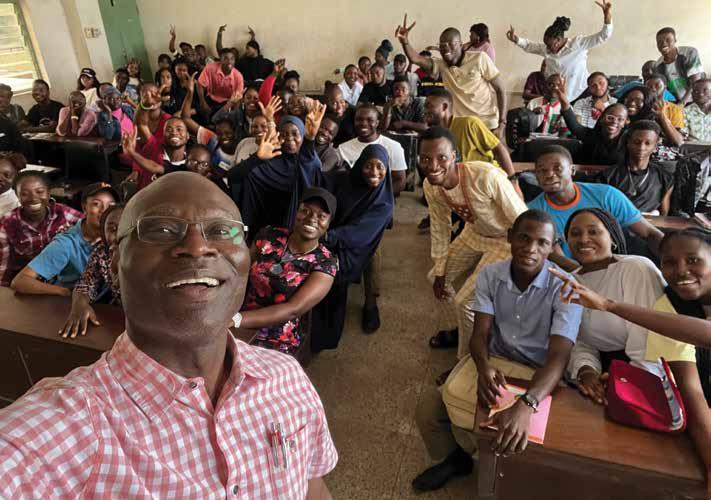
Though that team didn’t create an ag product, this lesson demonstrated the steps needed to construct a profitable business. Adapting evolving technologies for Nigerian farms will take ingenuity as well as making creative use of available resources.
Odeh’s work didn’t end in the classroom during his Nigerian stay. After receiving an invitation to present at the U.S. Embassy, he noticed other universities had promotional materials and information available to visitors. Stan State is now planning to do the same.
He also organized a workshop on open-source statistical packages and gave a keynote address at a symposium organized by the student's association. Facilitating the establishment of an alumni association of the university’s Department of Agriculture and Resource Economics was another highlight of the trip. As a separate venture, he joined friends to create a
school that will provide high schoollevel education in the state capital and also cater to students with disabilities. The school is scheduled to open in August 2025.
Now that he’s back at Stan State, the benefit of his Fulbright opportunity continues with his current students.
“I have a responsibility to ensure that our students get a broader understanding of the agriculture industry,” he said. “Most of our crops are being exported. How do we ensure the next generation of leaders in the ag industry is conscious that the market is broader than the U.S.? How do they continue to educate themselves, become aware and be sensitive to this changing demand and the opportunities in the world?
“Ag businesses will survive because everybody has to eat. Being sensitive to emerging opportunities and the technologies that come along with them is critical for any business to survive.”
Odeh’s background and appreciation for agriculture were fostered by visiting the cocoa plantation owned by his mother’s family as a child.
“Some think of ag as a career,” Odeh said. “We see it as a privilege, but with it comes responsibility. It is a huge responsibility to be able to feed the world.
“Africa’s food insecurity is huge. Stan State is located in arguably the most productive area in the world. Our responsibility is not only to people here but to feed the world — acting locally while thinking globally. That’s one of the reasons I think it’s very important to delve deeper into this issue of how we feed the world’s increasing population. That is what has led me on this path.
“We have a responsibility to prepare students for the challenges they will face and the responsibility to feed their generation and those coming after them.”
Sitting with a group of fellow nursing students, Stanislaus State’s Ted Elijah shared a story about an encounter he had with a fellow Warrior at a local hospital.
She was an OB patient on the floor he was assigned to work that day, recalled Elijah, a student in the University’s Accelerated Second Bachelor of Science in Nursing (ASBSN) program. He could tell that she was really scared.
But when the young woman noticed the Stanislaus State patch on Elijah’s uniform, her fear softened.
“She said, ‘Oh, I go to that school,’” Elijah said. “That connection brought her comfort in a very difficult moment. That one small point of connection helped her feel more peaceful, and it meant a lot to me to see that.”
Elijah, who began his academic career studying biology, had considered becoming a medical doctor, but he realized he wanted to build relationships with patients and provide more direct care.
“When I saw that Stan State offered a second bachelor’s in nursing, a 17-month program, it felt like the perfect way to get into nursing quickly and efficiently,” he said. “The program has a strong reputation in the Central Valley. In fact, even in the Bay Area, people know about Stan State’s nursing program.”
Offering skilled care rooted in compassion is the kind of impact Stanislaus State
students and alumni are making every day in Central Valley’s hospitals, clinics and care facilities.
The University is addressing one of the region’s most pressing challenges: a growing shortage of healthcare professionals. Through nationally ranked
state’s healthcare system, the San Joaquin Valley has only about 47 primary care physicians for every 100,000 residents — well below the state average of 60 and significantly lower than the Bay Area’s 80. In San Joaquin County specifically, the number drops to around 39.
“When I saw that Stan State offered a second bachelor’s in nursing, a 17-month program, it felt like the perfect way to get into nursing quickly and efficiently.”
- Ted Elijah
academic programs, hands-on training and mission-aligned partnerships, Stan State is preparing students to lead in healthcare and improve lives throughout the Central Valley.
California’s Central Valley is one of the fastest-growing regions in the state, and San Joaquin — one of six counties in Stan State’s service area — is among those experiencing the most rapid growth. Despite that momentum, it remains one of California’s most medically underserved areas.
According to the California Health Care Foundation (CHCF), a nonprofit philanthropy organization committed to improving the
The shortage is even more severe when it comes to mental health professionals and registered nurses. A recent report from Healthforce Center at UCSF highlighted that 13 million Californians live in communities designated as mental health professional shortage areas. CHCF reports that by 2030, California is projected to be short 10,000 primary care providers, and the San Joaquin Valley alone will need 10,000 additional nurses to meet growing demand.
In response, Stanislaus State’s Stockton Campus is growing into a regional hub for health and human services training, designed to expand access, opportunity and impact. A new two-story academic building, set to open in fall 2025, will house a 16-bed

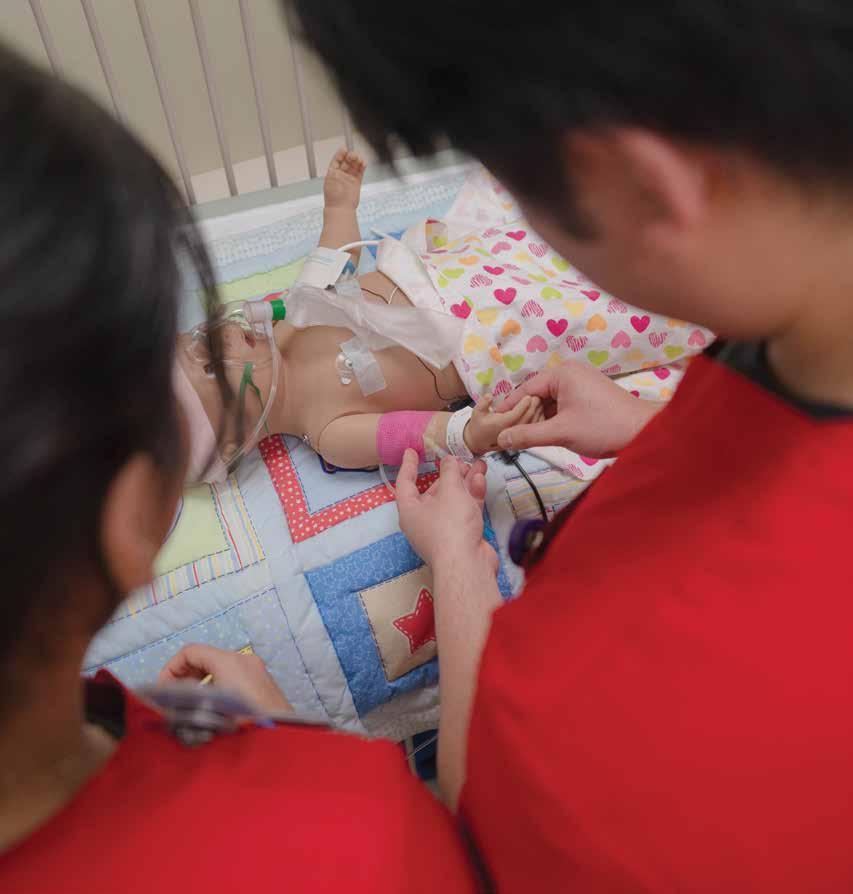
Transforming Healthcare Access in the Central Valley One Student, One Family, One Community at a Time
BY DONNA BIRCH TRAHAN
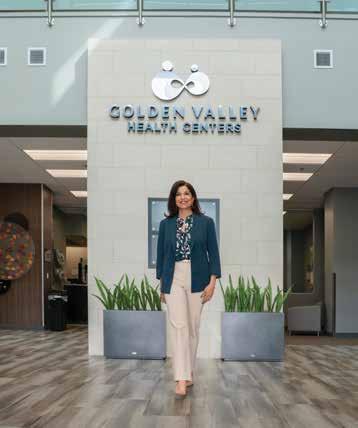
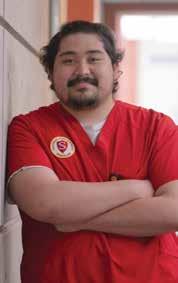
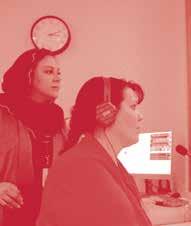

nursing skills lab, a two-bed high-fidelity simulation suite and a 13-bed physical diagnosis space to support instruction for nursing students. The space will also support students preparing for careers in roles providing primary care, including family nurse practitioner candidates and potentially future physician assistant students.
The University already offers its ASBSN program at the Stockton Campus, producing 40 graduates every 18 months, with plans to double that number. It also offers a Family Nurse Practitioner program, currently training 15 to 25 students at a time, and a Master of Social Work program that launched its part-time, three-year hybrid cohort last fall.
All of the ASBSN students featured in this story study at the Stockton Campus. It’s where their journeys began, where their families live and where they’re preparing to give back to the communities they call home.
Dean Sarah Sweitzer, who leads the Stockton Campus, sees the impact every day.
“We’re the only public four-year degree-granting campus in one of California’s fastest-growing counties,” she said. “Eighty-three percent of our students are here to earn a bachelor’s degree, and 70 percent are first-generation. That’s transformational.”
She describes the campus as a “homegrown engine” for meeting regional workforce needs, and a critical part of Stan State’s identity.
“We view ourselves as an anchor institution. That means embracing community wealthbuilding and staying rooted in the neighborhoods we serve.”
Sweitzer’s words reflect a mission that lives in the everyday
experiences of students who’ve chosen to stay local, serve their communities and lead with compassion.
“I was born at Dameron Hospital, grew up in Stockton, and I’ve worked as an EMT across both San Joaquin and Stanislaus counties,” said student Ryan Louie. “I knew the hospitals, I knew the community, and I knew I wanted to give back.”
Van Le, originally from Sacramento, said the diversity and need in the Central Valley stood out.
“I’ve lived in the Bay Area and Sacramento, and here, there’s a different level of poverty and healthcare need. Getting to serve this population has been eyeopening.”
For Francisco Ramirez, the need is especially personal.
“My family didn’t always have access to care,” he said. “Some of them didn’t have legal status, and that meant avoiding the ER, using home remedies. That’s why it’s so important to build more resources in this community.”
Russell Pabalan, whose parents immigrated from the Philippines and became nurses, said his motivation comes from a sense of responsibility to the place that shaped him.
“For me, it’s personal,” Pabalan said. “I grew up here. I want my family to have access to high-quality care. I want my community to have that too because community health impacts everyone. It’s essential that we have more RNs in our own communities.”
He also praised the program’s structure and rigor.
“We’ve rotated through so many departments: pediatrics, hospice, med-surg, so we’re not just getting a narrow experience.
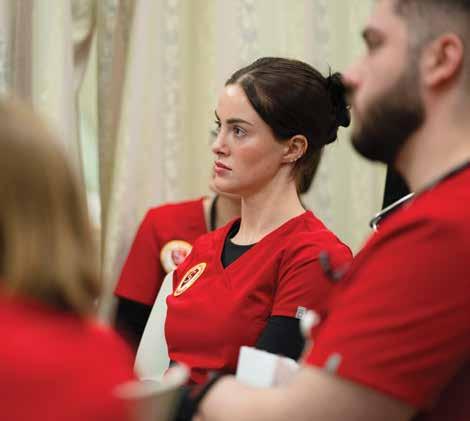
“And it’s not just working with RNs. We collaborate with dietitians, respiratory therapists, doctors, nurse practitioners — the full multidisciplinary care team. The simulations and curriculum we’ve gone through have directly translated to what we do in the hospitals. It’s been a tough 17 months, but now I see why it was all necessary. I do feel prepared.”
Ted Elijah added that the 225hour senior preceptorship — an intensive clinical placement where students work alongside experienced nurses — made a difference.
“Working under a nurse doing actual tasks has made a huge difference,” he said. “It’s been really valuable for applying all the theory we learned in class to real practice.”
As student Van Le, who joined the program later in life, said the experience has given her a deeper understanding of the region.
“I’m not originally from the Valley, but working with the population here has given me a new perspective,” she said. “I can see how different things are compared to where I’m from.”
Health leaders across the region are seeing Stan State’s impact up close and are investing in the future of the Valley’s healthcare workforce.
“Stan State is not just producing clinical professionals — it’s producing leaders,” said Lizeth Granados, CEO of Health Plan of San Joaquin, a not-for-profit health plan that provides MediCal services to more than 400,000 members in San Joaquin and Stanislaus counties. “The students they train are grounded in community, and that’s what makes the difference.”
Stan State alumna Amy CollierCarroll, vice president and chief communications officer at Golden Valley Health Centers (GVHC), a nonprofit community health center that serves about 175,000 patients each year across three counties and operates 47 clinics, echoed that sentiment.
“Stan State students bring heart, commitment and a deep
“For me, it’s personal. I want my family to have access to highquality care. Community health impacts everyone. It’s essential that we have more RNs in our own communities.”
- Russell Pabalan
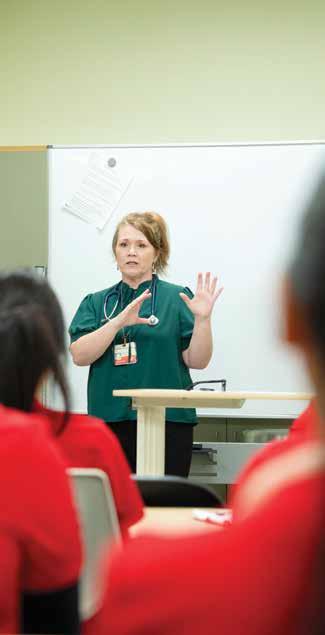
understanding of the Valley’s unique needs,” she said. “We see the difference they make in our clinics.”
Community-focused partnerships are helping drive Stan State’s impact even further by reducing financial barriers and creating career pathways for students while expanding access to care. U.S. Rep. Josh Harder helped secure $1.68 million in federal funding over three years to support stipends for students in the University’s Master of Social Work (MSW) program. The stipends support 35 MSW students who commit to working in the region for at least two years after graduation, directly addressing local behavioral health workforce shortages.
Legacy Health Endowment has also stepped up to support students. The nonprofit foundation has provided scholarship funding to help undergraduate nursing students in the ASBSN program pursue their education and clinical training without taking on significant debt.
GVHC has provided scholarships and mentorship opportunities for students who are committed to improving health access in the Central Valley.
Health Plan of San Joaquin, which provides managed care services to Medi-Cal patients in the region, has supported Stan State through partnerships that promote workforce development for community health workers.
HealthForce Partners Northern San Joaquin has also made a significant investment, contributing $310,000 to Stan State and awarding scholarships of up to $5,000 per student for those pursuing social work, clinical counseling or marriage and family therapy — critical fields facing growing shortages.
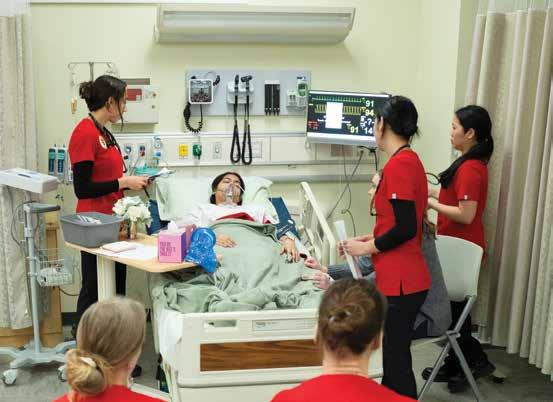
“Stan State is not just producing clinical professionals — it’s producing leaders. The students they train are grounded in community, and that’s what makes the difference.”
Lizeth Granados, CEO of Health Plan of San Joaquin
Together, these efforts are helping students gain early career experience while strengthening the region’s healthcare infrastructure with compassionate, culturally responsive professionals.
At the Stockton Campus, these partnerships are complemented by significant infrastructure growth. The new academic building now under construction will expand the University’s capacity to train nursing,
behavioral health and primary care professionals — advancing its role as a regional hub for health and human services.
The Stockton Campus is also home to vital training programs for community health workers, many of whom are bilingual and bicultural.
“They act as patient navigators and health advocates, and they come with lived experience that makes them trusted messengers,” Sweitzer said.
The University offers three community health worker cohorts per year, each completing an 80-hour curriculum. Some include up to 10 hours of experiential learning.
As of spring 2025, Stan State has trained 59 community health workers, including its first Spanish-language cohort.
“We’re focused on building the pipeline for future professionals,” Sweitzer added, noting the University’s work through a grant that introduces high school and community college students to healthcare career paths.
“We have alumni and current students leading opioid overdose training, building public health workshops and guiding high schoolers through simulations and case studies. It’s a powerful thing to watch them grow and to see the impact ripple outward.”
Stan State students and alumni are building meaningful, lasting careers in healthcare, both at the bedside and beyond.
Gurjeet Sandhu, vice president and chief financial officer at Golden Valley Health Centers and a Stan State alumna, knows that healthcare impact extends beyond clinical roles.
“From a young age, I helped my immigrant parents navigate their finances,” Gurjeet said.
“I understand firsthand the importance of healthcare access — especially for lowincome families. That’s why I’m
passionate about working in the Central Valley.”
She emphasized that financial infrastructure plays a critical role in healthcare delivery.
“Investing in infrastructure — billing, data systems, operational efficiency — helps reduce burdens on providers and improves patient outcomes,” she said.
Sandhu also credited Stan State for preparing professionals across the systems that make care delivery possible.
“Institutions like Stan State are essential for educating professionals in finance, operations, IT and HR — areas that support healthcare behind the scenes,” she said.
Her message to students?
“Even as a business or nonclinical major, you can make a huge impact in healthcare. Your skills help create the environment that allows care providers to focus on their patients. That work is just as vital.”
As California faces a growing shortage of healthcare providers, the work happening at Stanislaus State is more urgent than ever. Through rigorous training and community partnerships the University is preparing the next generation of nurses and health professionals to meet the needs of the Central Valley.
For alumna Amy Collier Carroll, the road to her role as a communications professional in the healthcare field wasn’t straightforward, but it led her to work she is connected to.
“My dad was a therapist. My mom was a nurse who worked at Memorial Medical Center and retired right when COVID hit. My brother is a nurse, too,” she said. “Growing up, I was surrounded by people in healthcare. But I wasn’t interested in that field at all — not directly.”
Over time, she discovered something more lasting.
“What I’ve realized is that I have this deep desire to serve my community,” she said. “I want to help create a place where people can live well, raise families and grow old with dignity.”
The impact is clear. Whether it’s a graduate stepping into a local clinic for their first day on the job or moment of connection between a student nurse and a frightened patient, Stan State is helping close gaps and open doors.
And for Elijah, that moment of recognition still lingers — a connection that crossed uniforms and uncertainty.
“She was already going through so much,” Elijah said, recalling the young woman who looked up and saw his Stan State badge. “In that moment, I just wanted to be a calm presence — someone who could bring compassionate care alongside the medical care that was already being provided.”


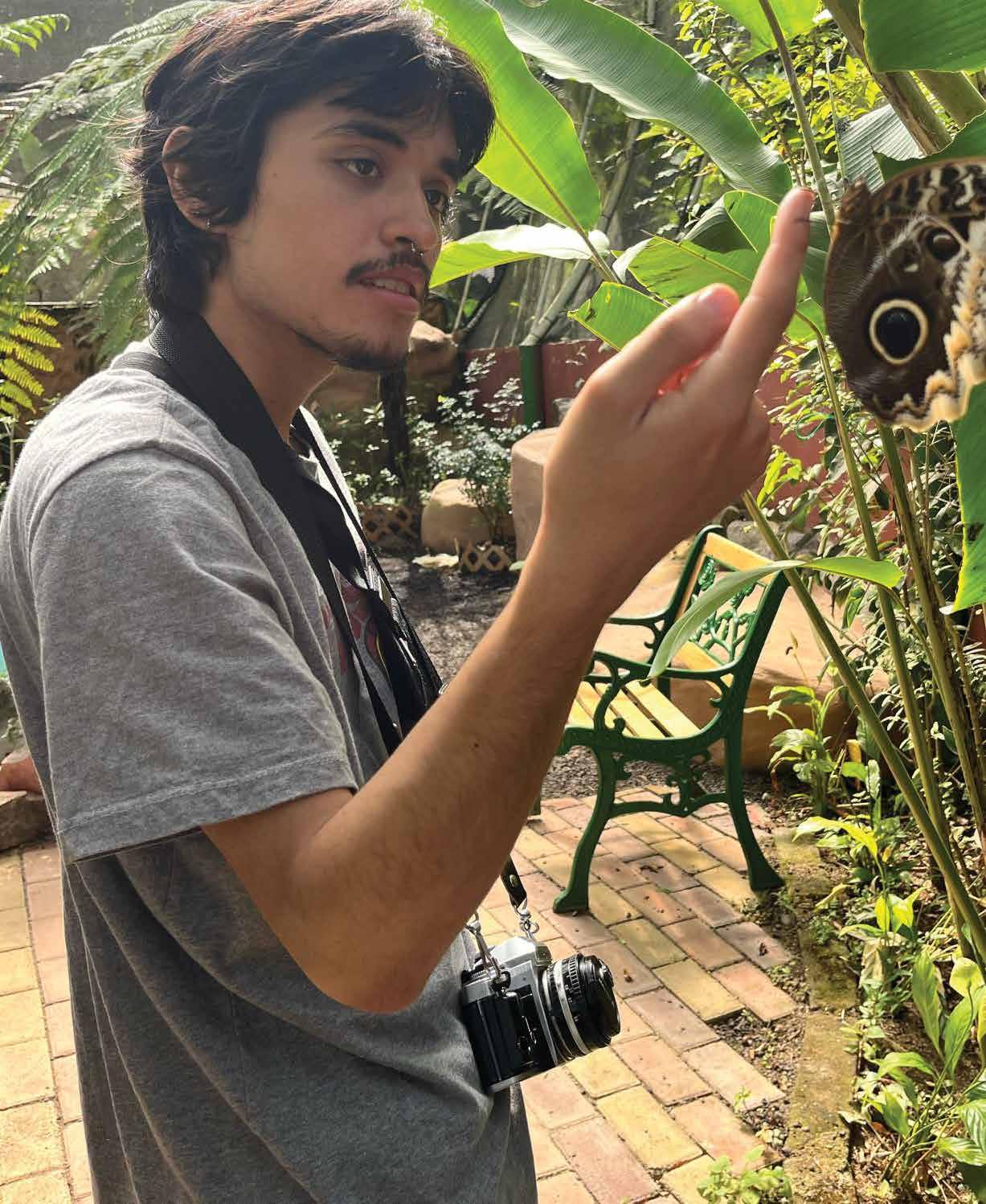
BY LORI GILBERT

Maximo Madrigal never considered Study Abroad until a member of his School of Nursing cohort, Charlene Evangelista, implored her classmates to join her on lecturer Esther Harris’s annual trip to Ecuador to satisfy the program’s transcultural class. He decided to join her.
I “thought it was a once-in-alifetime thing, and I needed to take advantage of it,” said Madrigal, who grew up in Modesto and graduated from Gregori High School.
Participation in Study Abroad has increased since the COVID shutdown according to Director of Study Abroad Brittany Fentress. The number has risen from 35 to 50. Part of the interest, she said, is students wanting to experience all they can after missing activities during the shutdown. Part of it is an increase in faculty-led programs.
One such program had prompted her to make her first venture out of the country as a student at Murray State near her Kentucky home.
“I took a World Civ class, and the teacher was taking a group to China,” Fentress said.
She worked three jobs to pay for it and spent five weeks after her sophomore year on a historical visit to China.
A year later she went to Spain, which contributed six units to her Spanish minor, and then returned to China on a scholarship for two weeks.
Those trips left her wondering, “Where can I go next?”
She spent two years teaching English in Korea, a country that allowed her to bring her cat, Greta Garbo — a nod to Fentress’s love of old movies — then earned a master’s degree in England at the University of York and landed a job in international studies at Murray State.
Fentress came to Stan State nine years ago and has been encouraging students to consider Study Abroad since. Whether a short-term faculty-led trip, a semester in a new country — Spain and Korea are most popular — or a year-long program, Fentress is a proponent of them all because of her own experiences.
“It took my education to the next
level because I realized how little I knew,” Fentress said. “Seeing the impact these historical events had on modern society was so impactful, it became a desire to learn more and see more and do more and be better, and I know it’s a cliché, but be a citizen of the world.”
Now she encourages students to become citizens of the world.
Madrigal’s three weeks in Ecuador visiting five hospitals and seeing traditional methods, including birthing from a standing position, were equally impactful.
“I thought it was a once-ina-lifetime thing, and I needed to take advantage of it.”
- Maximo Madrigal
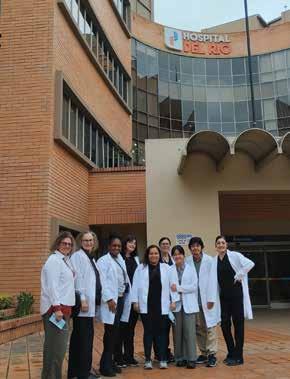
“I would like to ignite a spark of deeper conversation coming from the students for the need of thinking about the world, of learning more about the world, of transforming Stan State into a more meaningful place.”
- Sebastián Sclofsky Criminal Justice Associate Professor
“The focus was on opening our minds to what healthcare entails and understanding how culture plays a role,” Madrigal said. “I had these presumptions the United States had the best health care, had the most advanced hospitals, had the best treatments. I was pleasantly surprised by the hospitals we saw. The staff were very professional, well-educated doctors from around the world. Their facilities were really nice and advanced.”
Although he embraces and values the science-based training he is receiving, Madrigal has come to see there may be other methods of practicing medicine determined by culture.
“I think what I really got out of the trip was being a little more open-minded, a little more spiritual, a little more understanding that people have their own treatment preferences,” Madrigal said. “Ecuador shifted my perspective on life, how I approach it.”
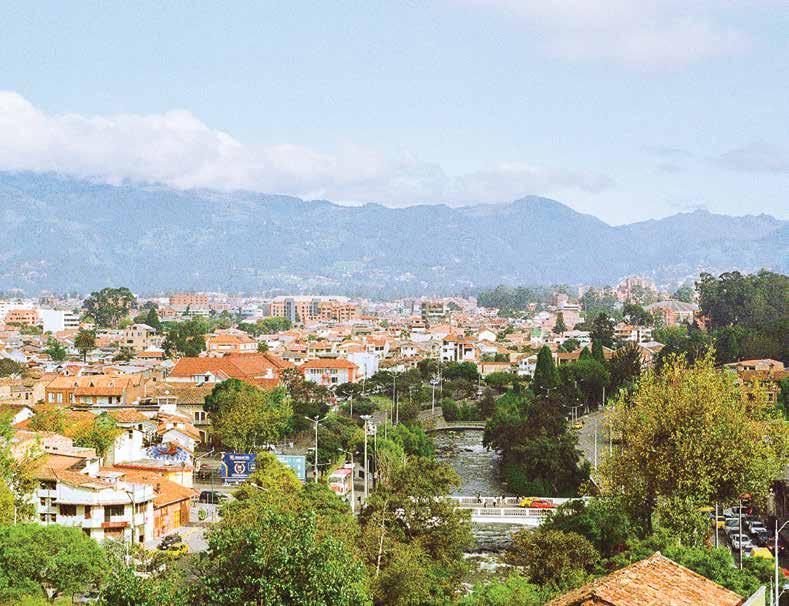
Criminal Justice Associate Professor Sebastián Sclofsky hopes his first faculty-led trip from Stan State, planned for this summer, will have an equally profound impact.
The two-week trip, from June 3-17 entitled “From Darkness to Light,” explores Holocaust history in Germany and Poland and offers a unit of credit for students. It is open to anyone from the campus or the public.
Sclofsky knows, however, that the cost could be a burden for interested students and is hoping to gather additional financial support to provide them with the experience. He is seeking support through grant funding and connections in the community. Anyone who would like to support this educational Study Abroad opportunity for students can make a contribution on the program’s website.
A gift of any amount will go directly to making this a once-ina-lifetime experience for students — $50 can provide pay for a week of transportation during the trip, $150 will cover the cost of a passport and $1,000 can provide airfare for a student.

Why should students and community members take the trip? Sclofsky says it’s a universal topic that asks us to reflect on our humanity.
“It needs to be studied, understood and analyzed,” he said. “This trip needs to be experienced as part of forming or educating individuals toward a more tolerant and democratic society. It doesn’t matter what your major is. There are elements that touch every life. This is a universal thing. This is about humanity.”
Sclofsky spent a large portion of his fall sabbatical planning the trip, traveling to Berlin and Poland and walking six to seven hours a day to map the places he wanted to include. He’s led trips to Poland many times, but this is the first two-week trip, the first with mostly non-Jews and the first for the University.
It will include not just concentration camp visits but also historic looks at the thriving Jewish life that existed in Berlin and Poland before the war.
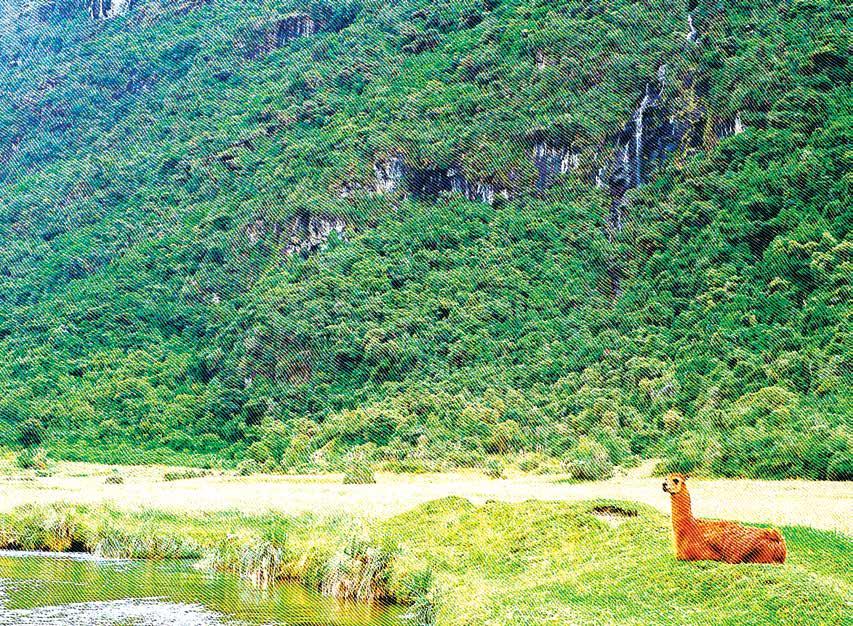
“One of the things I’m trying to do is to raise questions and have discussions on what are the lessons to learn from this huge historical event,” Sclofsky said.
He’s still uncertain how his students will respond knowing that the experience will ask a lot of them physically and mentally.
“I hope they have a positive experience, despite the topic,” Sclofsky said. “I’m excited about it because of the conversations and the dialogues it generally sparks. It’s learning, it’s listening to the stories and having those conversations on the ground. It’s a tough trip. It’s tough physically. It’s a lot of walking.
“It’s also tough emotionally, but I’m convinced it’s going to be impactful for our students.”
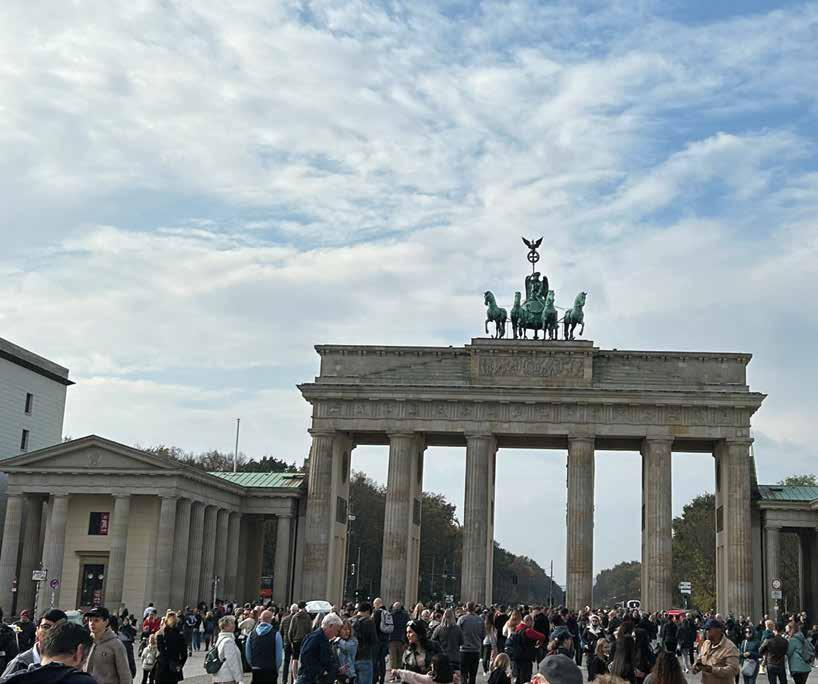
The subject is important to Sclofsky, whose Jewish grandparents immigrated to South America from Germany and Poland.
He grew up around Holocaust survivors in his native Uruguay. His father, a human rights attorney and leader of Uruguay’s Jewish community, worked to find Nazis hiding in South America and was on the Claims Commission seeking to force Swiss banks to return money to Jewish Holocaust victims.
“This theme was always surrounding me,” said Sclofsky, who earned his undergraduate and master’s degrees
from the Hebrew University in Jerusalem.
Studying in Israel, he led tours of Poland for South American college students and recent high school graduates for five years until he came to the U.S. in 2011 to begin a Ph.D. program in political science at the University of Florida.
“The late historian, Yehuda Bauer (researcher at Yad Vashem in Jerusalem), said the Holocaust can be a warning or can be a precedent,” Sclofsky said. “I find it extremely important, not only from my Jewish history, but from a universal
perspective, that it’s fundamental to learn about the Holocaust, particularly with the emphasis of transforming its lessons into a warning. I raise the questions of how ordinary people became mass murderers. How some few became rescuers. How the vast majority became bystanders.”
Now he returns for a longer, expanded journey that is about more than teaching the Holocaust.
“I would like to ignite a spark of deeper conversation coming from the students for the need of thinking about the world, of learning more about the world, of transforming Stan
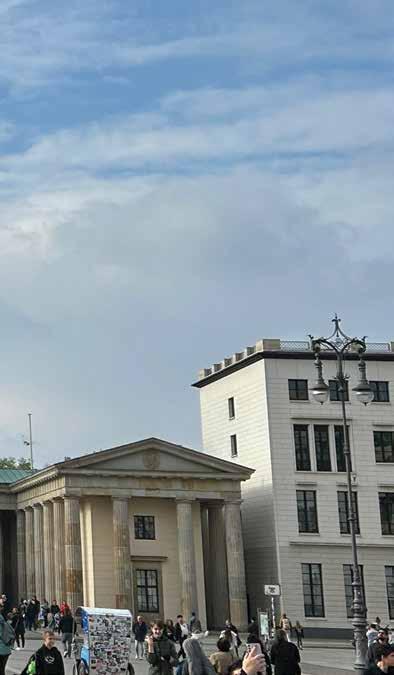
State into a more meaningful place,” Sclofsky said. “They need to know the world is much larger than where we live. I want to set the tone for this program to continue and more programs of this type. I want to convince our administration to invest in our students and these types of experiences.”
Sclofsky hopes administrators will help fund student participation, take the trip themselves and come to understand his perspective as a professor, which is that “the biggest challenge of this University is to develop an informed public.”
He’d also like to set an example for other faculty to create Study Abroad trips for students. Monumental work may go into it, Sclofsky admits, but Stan State students are worth the effort.
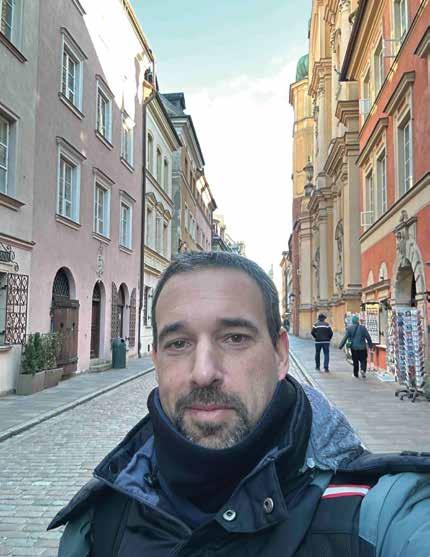
When Stanislaus State’s first appearance in the NCAA Division II Volleyball Tournament ended in a 3-0 (26-24, 27-25, 25-11) first-round loss to Chaminade in the Western Regional, the Warriors had an emotional meeting in the locker room. The players were understandably disappointed.
Third-year coach Lauren Flowers, six months pregnant at the time and admittedly emotional, told them, “This loss does not define you or this season.”
Indeed, the 2024 Warriors, 22-8, rolled out impressive first-time accomplishments and put Stanislaus State on the national volleyball map.
They were the first Stan State volleyball team in University history to win the California Collegiate Athletic Association (CCAA) Tournament. A banner bearing that accomplishment hangs in Fitzpatrick Arena. That championship meant the Warriors played in the NCAA Division II postseason tournament for the first time. Championship rings for the players are on order.
That’s just hardware, though.
The 2024 team was about so much more.
It was about seven seniors who had graduated and could have moved on, but because of losing a season to COVID, had the opportunity to play one more year.
“I’m going to remember the hard times that made us better — hard conversations I had in my office last spring when we came off a bad season (9-18) and I was trying to convince some of these players to come back,” Flowers said. “I told them, ‘There’s no way you want to end on that note. You have to end on your own terms. I know it’s hard and
I know it’s a grind, but it’s going to be worth it.’”
Those seven — Autumn Kirby, Maria Iosua, Haley Burdo, Makenna Carrillo, Gabby Rawson, Alex Byrd and Ellison Weaver — led the way to the NCAA Tournament. They welcomed new players.
The team bonded with an international trip to Costa Rica in summer 2024, which enabled them to get a jump on practices and play early matches. The relationships and quality of play only built from there. Newcomers were as critical as veterans.
There were ups and downs, but the Warriors went to the CCAA Tournament on a successful run.
“Going into the tournament, we all wanted to win, of course, but we didn’t put this stressful expectation of, ‘We have to win,’” Weaver said.
The team approached matches with the same mentality that had evolved during the season.
“A lot of us took it one game, one point at a time,” Burdo said. “It wasn’t a huge expectation for us to win the tournament from the very start.”
Stan State beat Cal State East Bay in the first round and, in the second, beat San Francisco State for the first time. It defeated Cal State LA in the championship match.
“There was a total belief from everyone on the team that the people on the other side were going to have to beat all of us,” Weaver said. “There was a huge belief in each other.”
“Compared to last fall, it was a whole new team, a whole new confidence, a whole new team mindset,” Burdo said.
Mental toughness was an area of focus for Flowers and Assistant Coach Maggie Billingsley. It became
as much a part of daily practice as wind sprints and hitting drills.
Flowers came to Stan State as a firsttime head coach from an assistant coaching position at East Texas A&M (formerly Texas A&M, Commerce).
“In my third season as a head coach, everything I’m doing is an experiment to see what works and what doesn’t and what my coaching philosophy is,” Flowers said. “That was the biggest takeaway of the season. It was nice and comforting to see that doing things the right way wins, still.
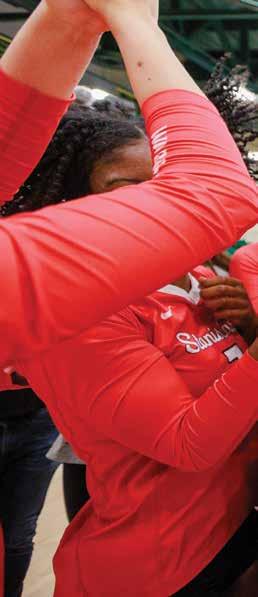

“I don’t want to sacrifice competitive excellence. I want to win all the time. We as a staff chose to take care of these players, to care about them as people on the court and off, and that made them better volleyball players. That was the biggest epiphany. I want to hold people to a high standard. I don’t want to sell my soul to win volleyball games. I don’t want to sacrifice my family or my players’ mental health. We can still win.”
Now, the challenge is to build upon this year’s success and continue to improve on foundational elements that were instrumental in this record-setting season.
“Are we going to win a championship every year?” Flowers asked. “I don’t know. There’s a lot that goes into that, but we can consistently win by doing things we’ve been doing.”
It’s a work in progress. Flowers’ first team in 2022 was 19-10 but slipped in 2023. The 2024 team had the best season in school history. It will always be special to her.
“You couldn’t ask for a better way for a special class to go out,” Flowers said.
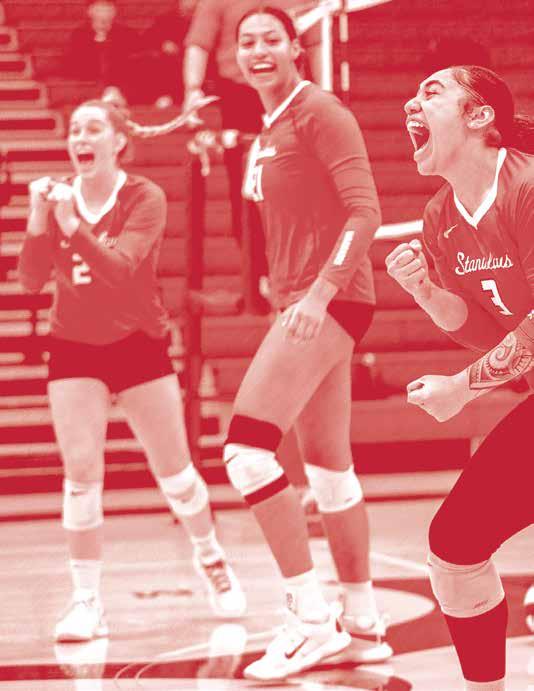
BY LORI GILBERT

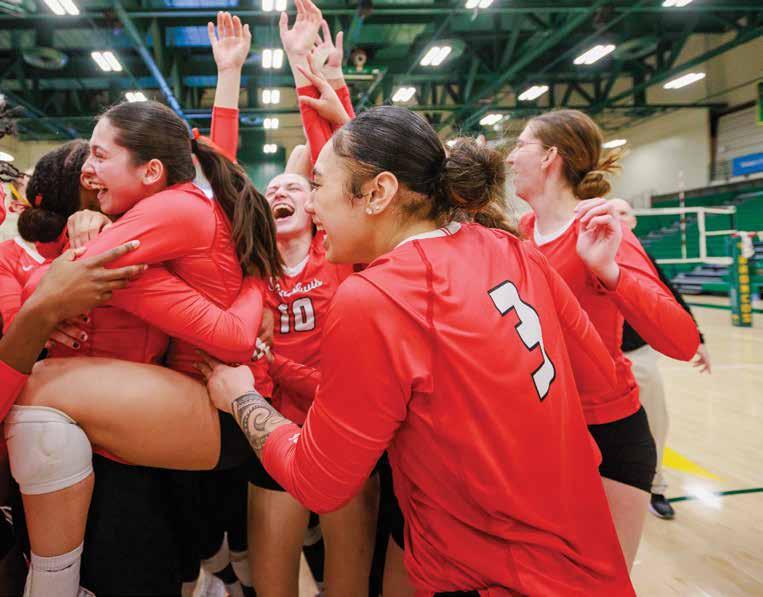
Stanislaus State opened its doors in 1960 with a vision: to bring life-changing opportunity to the Central Valley through higher education. More than six decades later, that mission is alive and well, and now, it’s driving a unifying new campaign.
This spring, that legacy enters a new chapter with 1960 Minutes of Giving, the Stan State’s first-ever Day of Giving.
From 8 a.m. April 30 to 4:40 p.m. May 1, alumni, faculty, staff, students and friends are invited to support the scholarships, programs and services that make Stanislaus State thrive, all during a 1,960-minute campaign inspired by the year the University opened its doors.
Anyone can take part, from first-time donors and student clubs to longtime alumni and local supporters. All gifts will support scholarships, academic programs, student success services and campus enhancements. Matching and challenge gifts will help amplify each contribution.
“Why 1,960 minutes? It brings us back to when the University was established and a reminder of why we’re here — our students, our mission and our values,” said Rosalee Rush, interim vice president for University
Advancement. “This is our chance to do something different, coming together as a community to rally support for the programs that make Stanislaus State special.
“I think we’re in a critical time in higher ed and the University in terms of investment in our institutions. When you invest in Stan State, you’re not just investing dollar-wise, you’re investing in opportunity and access. Stan State is No. 2 in the nation for social mobility — and this campaign shows exactly what that means.”
Philanthropy has long influenced the University’s story, thanks to supporters like Dieter and Hanna Renning. Dieter, a retired economics professor emeritus, began giving just $10 a month and eventually increased to $50 a month, sustaining that support for more than 15 years. Since 1987, their steady contributions have grown into more than $29,000 in scholarship funds supporting the Renning Economics and Renning Music Scholarships, proof that even modest gifts, given consistently, can create a lasting impact.
This campaign builds on that spirit of generosity, inviting the entire Warrior
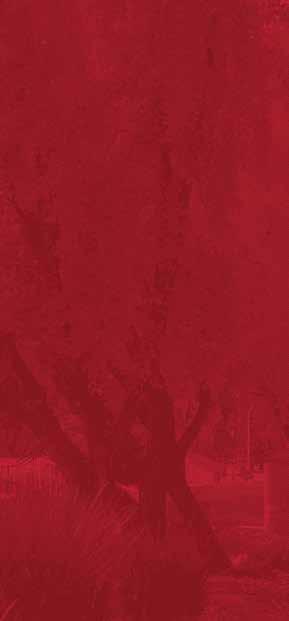
community to come together in support of student success.
“Collective giving is important because it helps establish a culture of generosity, both internally and externally. It also has the power to double our impact,” Rush said. “That collective effort amplifies our impact. It reinforces just how much this University matters to our students and the communities we serve.”
Support may fund internships, mentoring, research, basic needs support or enhanced learning spaces. Just as important, Rush said, are gifts that create a sense of belonging: “They help us open our doors wider and send a clear message: ‘This is for everyone. You belong here.’”
BY DONNA BIRCH TRAHAN

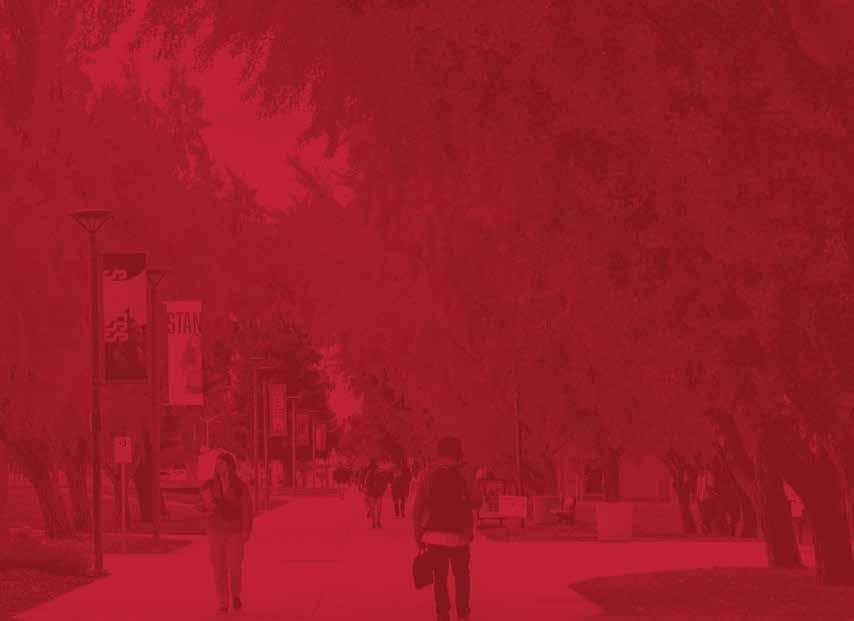
Join the Movement
Giving is easy and impactful. Donors can:
Make a gift to the area that matters most. Whether it’s a student organization, an academic department, or a campus initiative, there’s a fund for every passion.
Promote the campaign using #StanForACause.
Participate in the Day of Giving Warrior Wednesday celebration on April 30.
“What if you gave just $19.60 a month?” Rush said. “That amount could cover a meal, help with transportation to a job-shadowing opportunity, or make it possible for a student to participate in a campus activity. Whether through a financial gift, donating to the career closet or food pantry, or simply spreading the word, every contribution helps.
“We’re launching something new, and this is the perfect chance to get involved and make a real impact for our Warriors,” Rush said. “Whatever you’re passionate about, you can give in a way that matters—ensuring our students thrive. Stan State is at the heart of the
Valley, driving opportunity and success for our region. When we invest in our students, we strengthen our entire community. I hope everyone will join us in this mission and help make this campaign a success.”
“This
is for everyone. You belong here.”
- Rosalee Rush Interim Vice President University Advancement
STANISLAUS STATE
One University Circle Turlock, Ca 95382
“Being a first-generation student at Stan State was life changing. I graduated debt-free, and the support of my professors inspired me to pursue my dream to become a broadcast journalist.”
- Gaby Muro, ’24 B.A. Communication Studies
You can help shape the next generation of leaders and innovators. Find an area that resonates with you — whether it’s scholarships, academic programs, research initiatives or other key priorities — your support helps Warriors achieve their dreams.
